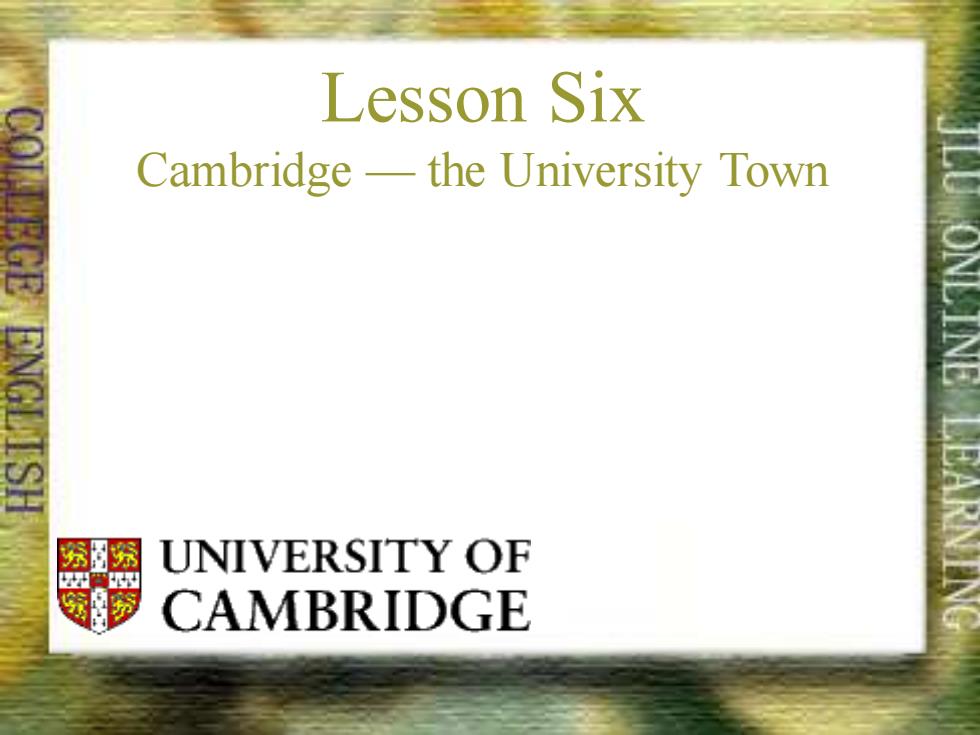
Lesson Six Cambridge-the University Town UNIVERSITY OF 宽 CAMBRIDGE
Lesson Six Cambridge — the University Town
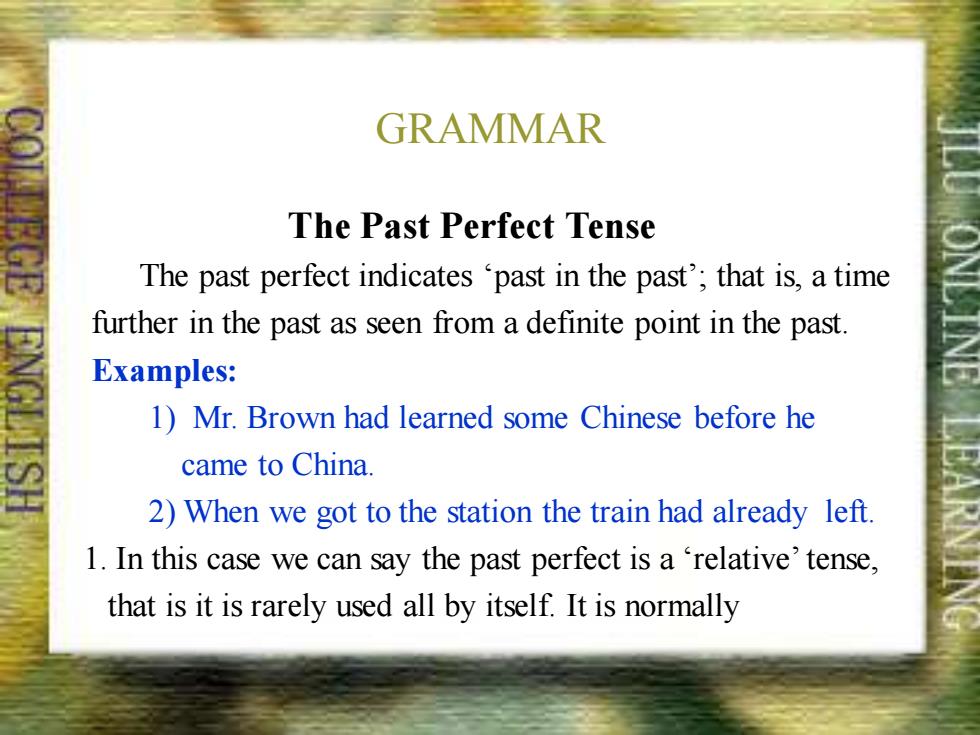
GRAMMAR The Past Perfect Tense The past perfect indicates past in the past';that is,a time further in the past as seen from a definite point in the past. Examples: 1)Mr.Brown had learned some Chinese before he came to China. 2)When we got to the station the train had already left. 1.In this case we can say the past perfect is a relative'tense, that is it is rarely used all by itself.It is normally
GRAMMAR The Past Perfect Tense The past perfect indicates ‘past in the past’; that is, a time further in the past as seen from a definite point in the past. Examples: 1) Mr. Brown had learned some Chinese before he came to China. 2) When we got to the station the train had already left. 1. In this case we can say the past perfect is a ‘relative’ tense, that is it is rarely used all by itself. It is normally

used with reference to another action or a point of time in the past.it is, therefore,incorrect to say,"He had read Moby Dick.",unless the context makes it clear what time point the sentence is related to. 2.When describing one event following another in the past, we can show their relationsby using the past perfect for the earlier event,or else we can use the past tense for both,and rely on the conjunction (e.g.after,when)to show which event took place earlier.for example,we can either say: Example: When the teacher had left the room,the children started talking
used with reference to another action or a point of time in the past. it is, therefore, incorrect to say, “He had read Moby Dick.”, unless the context makes it clear what time point the sentence is related to. 2. When describing one event following another in the past, we can show their relationsby using the past perfect for the earlier event, or else we can use the past tense for both, and rely on the conjunction (e.g. after, when) to show which event took place earlier. for example, we can either say: Example: When the teacher had left the room, the children started talking
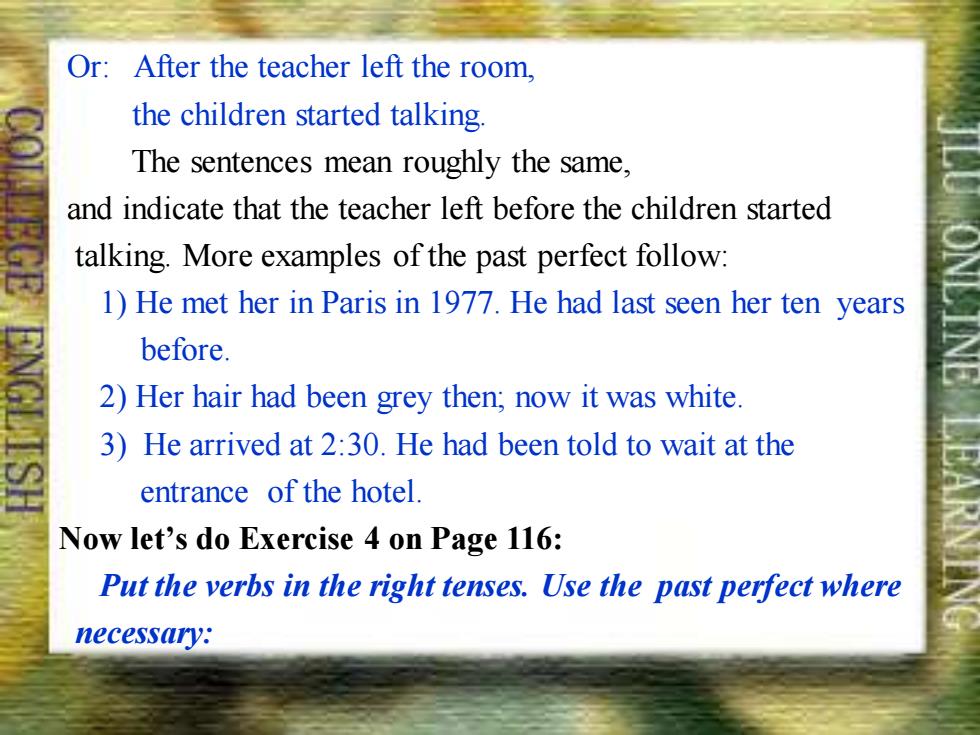
Or:After the teacher left the room, the children started talking. The sentences mean roughly the same, and indicate that the teacher left before the children started talking.More examples of the past perfect follow: 1)He met her in Paris in 1977.He had last seen her ten years before. 2)Her hair had been grey then;now it was white 3)He arrived at 2:30.He had been told to wait at the entrance of the hotel. Now let's do Exercise 4 on Page 116: Put the verbs in the right tenses.Use the past perfect where necessary:
Or: After the teacher left the room, the children started talking. The sentences mean roughly the same, and indicate that the teacher left before the children started talking. More examples of the past perfect follow: 1) He met her in Paris in 1977. He had last seen her ten years before. 2) Her hair had been grey then; now it was white. 3) He arrived at 2:30. He had been told to wait at the entrance of the hotel. Now let’s do Exercise 4 on Page 116: Put the verbs in the right tenses. Use the past perfect where necessary:
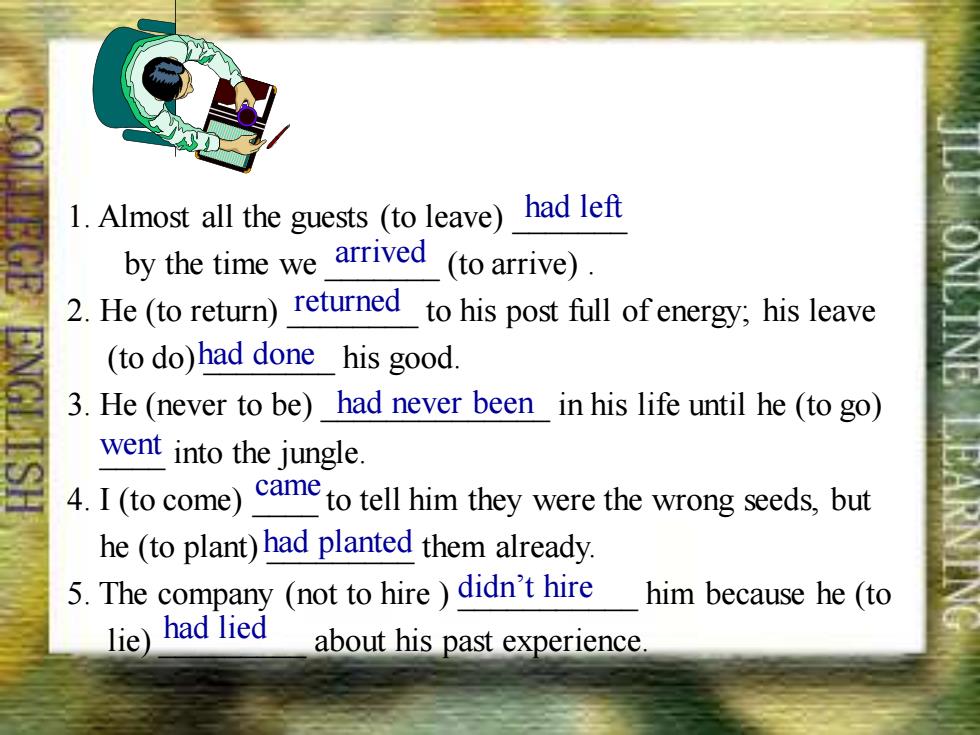
1.Almost all the guests (to leave)had left by the time we arrived (to arrive). 2.He (to return)returned to his post full of energy,his leave (to do)had done his good. 3.He (never to be)had never been in his life until he(to go) went into the jungle. 4.I (to come) came to tell him they were the wrong seeds,but he (to plant)had planted them already. 5.The company (not to hire)didn't hire him because he(to lie)had lied about his past experience
1. Almost all the guests (to leave) _______ by the time we _______ (to arrive) . 2. He (to return) ________ to his post full of energy; his leave (to do) ________ his good. 3. He (never to be) ______________ in his life until he (to go) ____ into the jungle. 4. I (to come) ____ to tell him they were the wrong seeds, but he (to plant) _________ them already. 5. The company (not to hire ) ___________ him because he (to lie) _________ about his past experience. had left arrived returned had done had never been went came had planted didn’t hire had lied

6.A man who (to be attacked) had been attacked by bandits(to lie)lay bleeding on the road. 7.After a while he (to realize)realized that he(to take) had taken the wrong path. 8.He(to try)tried to fan the fire,but it (to burn out) had burned out 9.She (to want)wanted to know what (to happen) had happened at the meeting. 10.There out of four ships(to return)returned;one(to be delayed)had been delayed by a storm
6. A man who (to be attacked) _____________ by bandits (to lie) ___ bleeding on the road. 7. After a while he (to realize) ______ that he (to take) ________ the wrong path. 8. He (to try) _____ to fan the fire, but it (to burn out) ____________. 9. She (to want) _______ to know what (to happen) ___________ at the meeting. 10. There out of four ships (to return) _______ ; one (to be delayed) ______________ by a storm. had been attacked lay realized had taken tried had burned out wanted had happened returned had been delayed
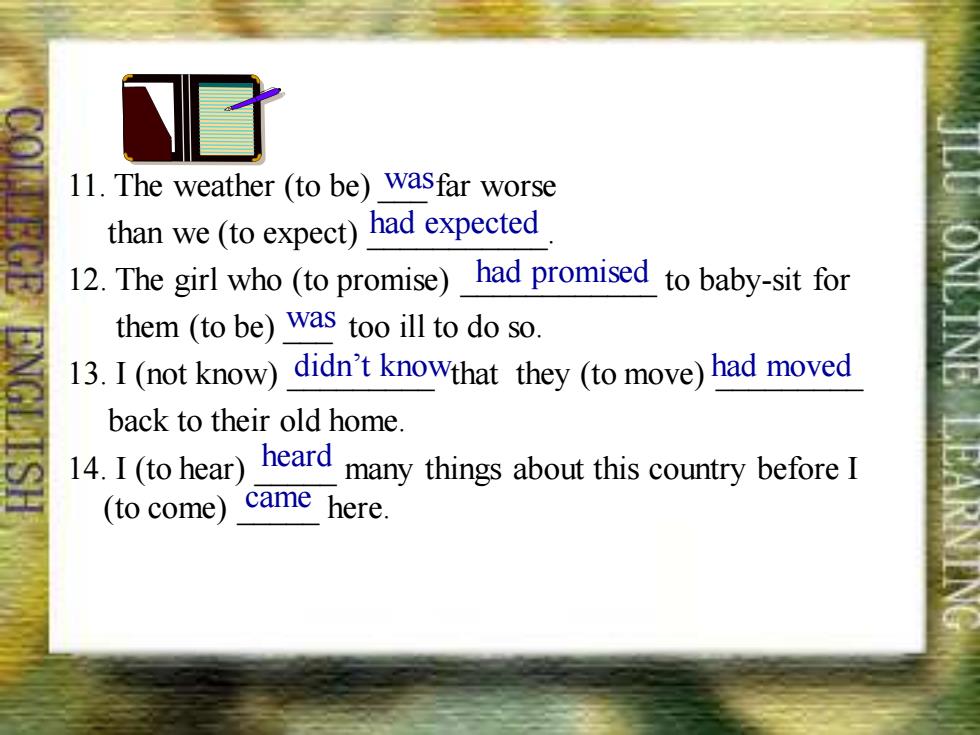
11.The weather (to be)wasfar worse than we(to expect)had expected 12.The girl who (to promise)had promised to baby-sit for them (to be)was too ill to do so. 13.I(not know)didn't knowthat they (to move)had moved back to their old home. 14.I(to hear)heard many things about this country beforeI (to come) came here
11. The weather (to be) ___ far worse than we (to expect) ___________. 12. The girl who (to promise) ____________ to baby-sit for them (to be) ___ too ill to do so. 13. I (not know) _________ that they (to move) _________ back to their old home. 14. I (to hear) _____ many things about this country before I (to come) _____ here. was had expected had promised was didn’t know had moved heard came
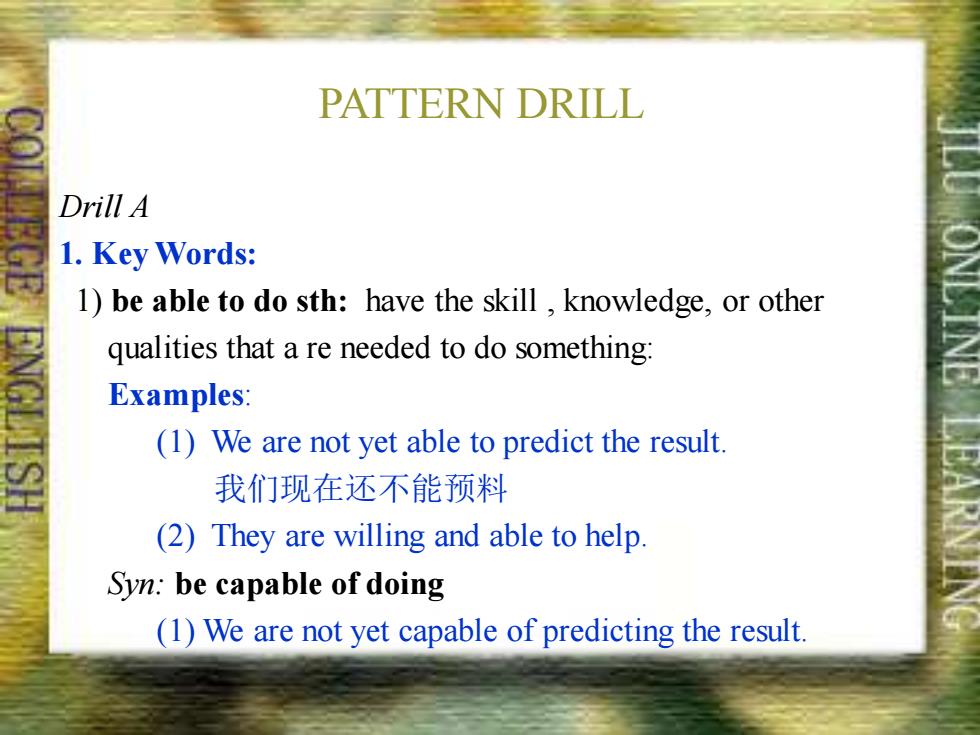
PATTERN DRILL Drill A 1.Key Words: 1)be able to do sth:have the skill,knowledge,or other qualities that a re needed to do something: Examples: (1)We are not yet able to predict the result. 我们现在还不能预料 (2)They are willing and able to help Syn:be capable of doing (1)We are not yet capable of predicting the result
PATTERN DRILL Drill A 1. Key Words: 1) be able to do sth: have the skill , knowledge, or other qualities that a re needed to do something: Examples: (1) We are not yet able to predict the result. 我们现在还不能预料 (2) They are willing and able to help. Syn: be capable of doing (1) We are not yet capable of predicting the result

(2)The new design is capable of improvement. 2)manage to do something:to succeed in dealing with something difficult: Examples: (1)I finally managed to find what I was looking for (2)The little child had somehow managed to tie his shoelaces together. 那个小孩不知怎么系上鞋带的。 3)see off:to go to the airport,station,etc.,with (someone who is beginning a trip); Examples: (1)I saw my friend off at the bus station
(2) The new design is capable of improvement. 2) manage to do something: to succeed in dealing with something difficult: Examples: (1) I finally managed to find what I was looking for. (2) The little child had somehow managed to tie his shoelaces together. 那个小孩不知怎么系上鞋带的。 3) see off:to go to the airport, station, etc., with (someone who is beginning a trip); Examples: (1) I saw my friend off at the bus station
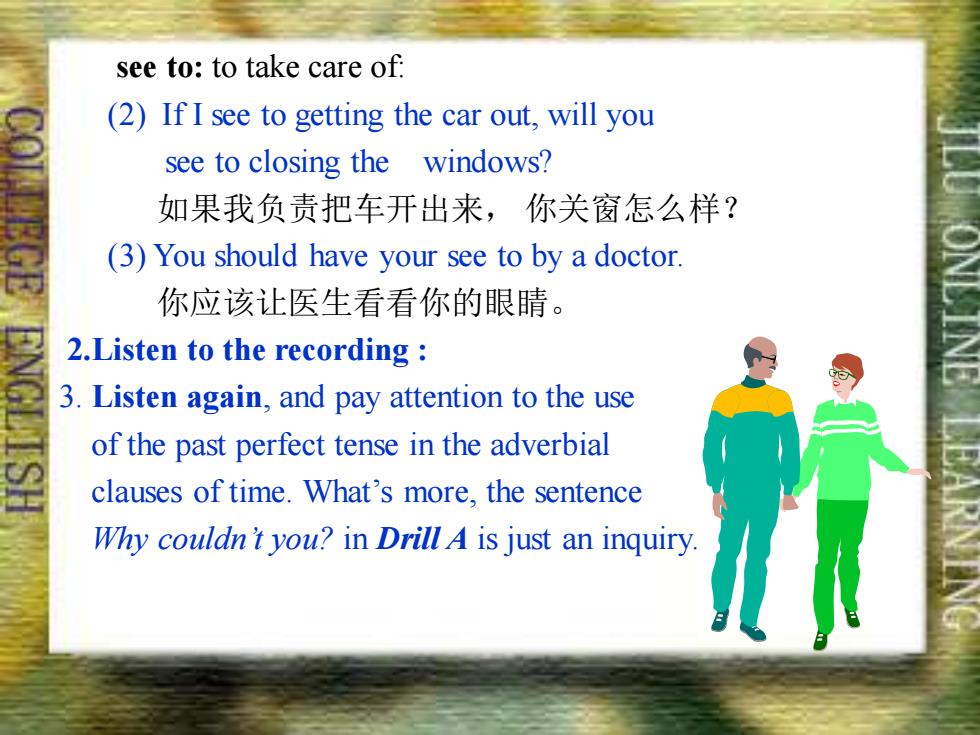
see to:to take care of: (2)If I see to getting the car out,will you see to closing the windows? 如果我负责把车开出来,你关窗怎么样? (3)You should have your see to by a doctor. 你应该让医生看看你的眼睛。 2.Listen to the recording 3.Listen again,and pay attention to the use of the past perfect tense in the adverbial clauses of time.What's more,the sentence Why couldn't you?in Drill A is just an inquiry
see to: to take care of: (2) If I see to getting the car out, will you see to closing the windows? 如果我负责把车开出来, 你关窗怎么样? (3) You should have your see to by a doctor. 你应该让医生看看你的眼睛。 2.Listen to the recording : 3. Listen again, and pay attention to the use of the past perfect tense in the adverbial clauses of time. What’s more, the sentence Why couldn’t you? in Drill A is just an inquiry